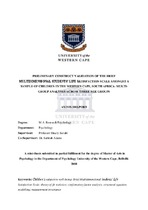| dc.description.abstract | The interest in researching children's well-being has increased substantially over the past few
decades. The increasing body of knowledge within children's well-being has become known
as the Child Indicator Movement. Further advancements in legislation catalysed an
epistemological shift in the conceptualisation of children and childhood, encapsulated within
the 'New Sociology of Childhood'. These advancements also shifted the unit of analysis, with
children transitioning from being absent in research, to being objects of research, to being
subjects of research. This served to ignite the interest in researching children's 'subjective'
positions, typically known as their subjective well-being. Using data from Wave 2 of the
Children's Worlds: International Survey of Children's Well-Being, the aim of the current
study was to conduct a structural validation of a measure of children's subjective well-being
(the Brief Multidimensional Students' Life Satisfaction Scale) amongst a sample of children
from the Western Cape Province, South Africa. The study also sought to test the convergent
validity of the Brief Multidimensional Students' Life Satisfaction Scale by regressing it onto
the single-item Overall Life Satisfaction scale. Data were collected using a stratified random
sample of children aged 8, 10, and 12-years old (N = 3 284) selected from 29 schools across
the Western Cape Province (South Africa) from both urban and rural geographical districts.
Data were analysed using Confirmatory Factor Analysis. The study found the Brief
Multidimensional Students' Life Satisfaction Scale to be an appropriate measure for use in
the South African context, specifically within the Western Cape Province of South Africa,
across the 8, 10, and 12-year old age groups. The study further found scalar invariance to be
tenable across the 10 and 12-year old age groups, which indicates that the two age groups are
comparable across correlations, regressions, and means. This infers that meaningful
comparisons can be made across the two age groups, and that children understand the items
in a similar manner. Finally, adequate loadings of the latent construct (the Brief
Multidimensional Students' Life Satisfaction Scale) onto the Overall Life Satisfaction scale
were found, confirming evidence of convergent validity. | |

